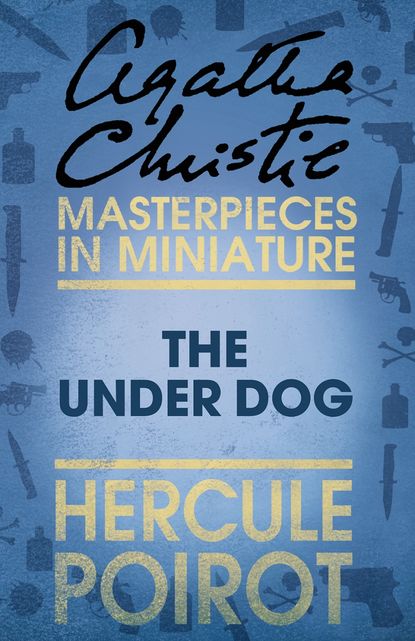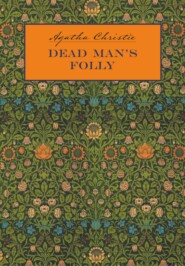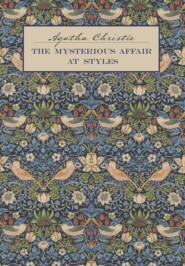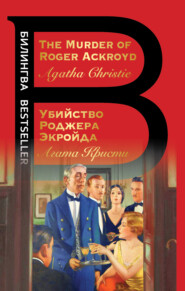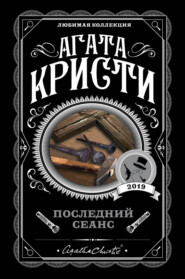По всем вопросам обращайтесь на: info@litportal.ru
(©) 2003-2024.
✖
The Under Dog: A Hercule Poirot Short Story
Автор
Год написания книги
2018
Настройки чтения
Размер шрифта
Высота строк
Поля
The Under Dog: A Hercule Poirot Short Story
Agatha Christie
A classic Agatha Christie short story, available individually for the first time as an ebook.‘One looks for humanity in these matters’Pretty Lily Margrave, smart little black hat pinned to her golden hair, is not convinced Hercule Poirot is needed in the matter of Sir Atwell’s murder at all. At the request of her employer, the emphatic Lady Atwell, she has had to recount the precise details of what happened that evening, ten days ago in the Tower room even though the victim’s nephew is incarcerated and charged with the murder. But, Lady Atwell’s persistent bee in her bonnet drives Poirot up to the great house, Mon Repos, to see if he can look beyond the cold facts presented by Miss Margrave and look for the humanity in the matter. Poirot soon takes up residence in Mon Repos, ensconcing himself in the household and all its nooks and crannies. However, whilst at first the family are struck by his ardent endeavour to find out what befell Sir Atwell in the Tower room, their disquiet at having a ‘ferreting little spy’ going through their rooms becomes too much for some to bare. With his signature ingenuity, a scrap of material and the contents of a tiny box lead the detective to uncover who is behind this violent act.
The Underdog
A Short Story
by Agatha Christie
Copyright (#u7484283c-003b-5311-8c84-479a2d27a059)
Published by HarperCollinsPublishers Ltd
1 London Bridge Street
London SE1 9GF
www.harpercollins.co.uk (http://www.harpercollins.co.uk)
Copyright © 2011 Agatha Christie Ltd.
All rights reserved under International and Pan-American Copyright Conventions. By payment of the required fees, you have been granted the nonexclusive, nontransferable right to access and read the text of this e-book on-screen. No part of this text may be reproduced, transmitted, downloaded, decompiled, reverse-engineered, or stored in or introduced into any information storage and retrieval system, in any form or by any means, whether electronic or mechanical, now known or hereinafter invented, without the express written permission of HarperCollins e-books.
EPub Edition © 2011 ISBN: 9780007451951
Version: 2017-04-15
Contents
Cover (#u6b996966-9c6c-5ac6-a883-4df27ef1c01b)
Title Page (#u059533d6-a575-508a-af27-712fc7c23649)
Copyright
The Underdog
Related Products (#litres_trial_promo)
About the Publisher (#litres_trial_promo)
The Underdog (#ulink_79b0832b-a93d-57bc-8ac6-5b4d1fe89201)
‘The Underdog’ was first published in the USA in Mystery Magazine, 1 April 1926, then in London Magazine, October 1926.
Lily Margrave smoothed her gloves out on her knee with a nervous gesture, and darted a glance at the occupant of the big chair opposite her.
She had heard of M. Hercule Poirot, the well-known investigator, but this was the first time she had seen him in the flesh.
The comic, almost ridiculous, aspect that he presented disturbed her conception of him. Could this funny little man, with the egg-shaped head and the enormous moustaches, really do the wonderful things that were claimed for him? His occupation at the moment struck her as particularly childish. He was piling small blocks of coloured wood one upon the other, and seemed far more interested in the result than in the story she was telling.
At her sudden silence, however, he looked sharply across at her.
‘Mademoiselle, continue, I pray of you. It is not that I do not attend; I attend very carefully, I assure you.’
He began once more to pile the little blocks of wood one upon the other, while the girl’s voice took up the tale again. It was a gruesome tale, a tale of violence and tragedy, but the voice was so calm and unemotional, the recital was so concise that something of the savour of humanity seemed to have been left out of it.
She stopped at last.
‘I hope,’ she said anxiously, ‘that I have made everything clear.’
Poirot nodded his head several times in emphatic assent. Then he swept his hand across the wooden blocks, scattering them over the table, and, leaning back in his chair, his fingertips pressed together and his eyes on the ceiling, he began to recapitulate.
‘Sir Reuben Astwell was murdered ten days ago. On Wednesday, the day before yesterday, his nephew, Charles Leverson, was arrested by the police. The facts against him as far as you know are: – you will correct me if I am wrong, Mademoiselle – Sir Reuben was sitting up late writing in his own special sanctum, the Tower room. Mr Leverson came in late, letting himself in with a latch-key. He was overheard quarrelling with his uncle by the butler, whose room is directly below the Tower room. The quarrel ended with a sudden thud as of a chair being thrown over and a half-smothered cry.
‘The butler was alarmed, and thought of getting up to see what was the matter, but as a few seconds later he heard Mr Leverson leave the room gaily whistling a tune, he thought nothing more of it. On the following morning, however, a housemaid discovered Sir Reuben dead by his desk. He had been struck down by some heavy instrument. The butler, I gather, did not at once tell his story to the police. That was natural, I think, eh, Mademoiselle?’
The sudden question made Lily Margrave start.
‘I beg your pardon?’ she said.
‘One looks for humanity in these matters, does one not?’ said the little man. ‘As you recited the story to me – so admirably, so concisely – you made of the actors in the drama machines – puppets. But me, I look always for human nature. I say to myself, this butler, this – what did you say his name was?’
‘His name is Parsons.’
‘This Parsons, then, he will have the characteristics of his class, he will object very strongly to the police, he will tell them as little as possible. Above all, he will say nothing that might seem to incriminate a member of the household. A house-breaker, a burglar, he will cling to that idea with all the strength of extreme obstinacy. Yes, the loyalties of the servant class are an interesting study.’
He leaned back beaming.
‘In the meantime,’ he went on, ‘everyone in the household has told his or her tale, Mr Leverson among the rest, and his tale was that he had come in late and gone up to bed without seeing his uncle.’
‘That is what he said.’
‘And no one saw reason to doubt that tale,’ mused Poirot, ‘except, of course, Parsons. Then there comes down an inspector from Scotland Yard, Inspector Miller you said, did you not? I know him, I have come across him once or twice in the past. He is what they call the sharp man, the ferret, the weasel.
‘Yes, I know him! And the sharp Inspector Miller, he sees what the local inspector has not seen, that Parsons is ill at ease and uncomfortable, and knows something that he has not told. Eh bien, he makes short work of Parsons. By now it has been clearly proved that no one broke into the house that night, that the murderer must be looked for inside the house and not outside. And Parsons is unhappy and frightened, and feels very relieved to have his secret knowledge drawn out of him.
‘He has done his best to avoid scandal, but there are limits; and so Inspector Miller listens to Parsons’ story, and asks a question or two, and then makes some private investigations of his own. The case he builds up is very strong – very strong.
‘Blood-stained fingers rested on the corner of the chest in the Tower room, and the fingerprints were those of Charles Leverson. The house-maid told him she emptied a basin of blood-stained water in Mr Leverson’s room the morning after the crime. He explained to her that he had cut his finger, and he had a little cut there, oh yes, but such a very little cut! The cuff of his evening shirt had been washed, but they found blood-stains in the sleeve of his coat. He was hard pressed for money, and he inherited money at Sir Reuben’s death. Oh, yes, a very strong case, Mademoiselle.’ He paused.
‘And yet you come to me today.’
Lily Margrave shrugged her slender shoulders.
‘As I told you, M. Poirot, Lady Astwell sent me.’
‘You would not have come of your own accord, eh?’
Agatha Christie
A classic Agatha Christie short story, available individually for the first time as an ebook.‘One looks for humanity in these matters’Pretty Lily Margrave, smart little black hat pinned to her golden hair, is not convinced Hercule Poirot is needed in the matter of Sir Atwell’s murder at all. At the request of her employer, the emphatic Lady Atwell, she has had to recount the precise details of what happened that evening, ten days ago in the Tower room even though the victim’s nephew is incarcerated and charged with the murder. But, Lady Atwell’s persistent bee in her bonnet drives Poirot up to the great house, Mon Repos, to see if he can look beyond the cold facts presented by Miss Margrave and look for the humanity in the matter. Poirot soon takes up residence in Mon Repos, ensconcing himself in the household and all its nooks and crannies. However, whilst at first the family are struck by his ardent endeavour to find out what befell Sir Atwell in the Tower room, their disquiet at having a ‘ferreting little spy’ going through their rooms becomes too much for some to bare. With his signature ingenuity, a scrap of material and the contents of a tiny box lead the detective to uncover who is behind this violent act.
The Underdog
A Short Story
by Agatha Christie
Copyright (#u7484283c-003b-5311-8c84-479a2d27a059)
Published by HarperCollinsPublishers Ltd
1 London Bridge Street
London SE1 9GF
www.harpercollins.co.uk (http://www.harpercollins.co.uk)
Copyright © 2011 Agatha Christie Ltd.
All rights reserved under International and Pan-American Copyright Conventions. By payment of the required fees, you have been granted the nonexclusive, nontransferable right to access and read the text of this e-book on-screen. No part of this text may be reproduced, transmitted, downloaded, decompiled, reverse-engineered, or stored in or introduced into any information storage and retrieval system, in any form or by any means, whether electronic or mechanical, now known or hereinafter invented, without the express written permission of HarperCollins e-books.
EPub Edition © 2011 ISBN: 9780007451951
Version: 2017-04-15
Contents
Cover (#u6b996966-9c6c-5ac6-a883-4df27ef1c01b)
Title Page (#u059533d6-a575-508a-af27-712fc7c23649)
Copyright
The Underdog
Related Products (#litres_trial_promo)
About the Publisher (#litres_trial_promo)
The Underdog (#ulink_79b0832b-a93d-57bc-8ac6-5b4d1fe89201)
‘The Underdog’ was first published in the USA in Mystery Magazine, 1 April 1926, then in London Magazine, October 1926.
Lily Margrave smoothed her gloves out on her knee with a nervous gesture, and darted a glance at the occupant of the big chair opposite her.
She had heard of M. Hercule Poirot, the well-known investigator, but this was the first time she had seen him in the flesh.
The comic, almost ridiculous, aspect that he presented disturbed her conception of him. Could this funny little man, with the egg-shaped head and the enormous moustaches, really do the wonderful things that were claimed for him? His occupation at the moment struck her as particularly childish. He was piling small blocks of coloured wood one upon the other, and seemed far more interested in the result than in the story she was telling.
At her sudden silence, however, he looked sharply across at her.
‘Mademoiselle, continue, I pray of you. It is not that I do not attend; I attend very carefully, I assure you.’
He began once more to pile the little blocks of wood one upon the other, while the girl’s voice took up the tale again. It was a gruesome tale, a tale of violence and tragedy, but the voice was so calm and unemotional, the recital was so concise that something of the savour of humanity seemed to have been left out of it.
She stopped at last.
‘I hope,’ she said anxiously, ‘that I have made everything clear.’
Poirot nodded his head several times in emphatic assent. Then he swept his hand across the wooden blocks, scattering them over the table, and, leaning back in his chair, his fingertips pressed together and his eyes on the ceiling, he began to recapitulate.
‘Sir Reuben Astwell was murdered ten days ago. On Wednesday, the day before yesterday, his nephew, Charles Leverson, was arrested by the police. The facts against him as far as you know are: – you will correct me if I am wrong, Mademoiselle – Sir Reuben was sitting up late writing in his own special sanctum, the Tower room. Mr Leverson came in late, letting himself in with a latch-key. He was overheard quarrelling with his uncle by the butler, whose room is directly below the Tower room. The quarrel ended with a sudden thud as of a chair being thrown over and a half-smothered cry.
‘The butler was alarmed, and thought of getting up to see what was the matter, but as a few seconds later he heard Mr Leverson leave the room gaily whistling a tune, he thought nothing more of it. On the following morning, however, a housemaid discovered Sir Reuben dead by his desk. He had been struck down by some heavy instrument. The butler, I gather, did not at once tell his story to the police. That was natural, I think, eh, Mademoiselle?’
The sudden question made Lily Margrave start.
‘I beg your pardon?’ she said.
‘One looks for humanity in these matters, does one not?’ said the little man. ‘As you recited the story to me – so admirably, so concisely – you made of the actors in the drama machines – puppets. But me, I look always for human nature. I say to myself, this butler, this – what did you say his name was?’
‘His name is Parsons.’
‘This Parsons, then, he will have the characteristics of his class, he will object very strongly to the police, he will tell them as little as possible. Above all, he will say nothing that might seem to incriminate a member of the household. A house-breaker, a burglar, he will cling to that idea with all the strength of extreme obstinacy. Yes, the loyalties of the servant class are an interesting study.’
He leaned back beaming.
‘In the meantime,’ he went on, ‘everyone in the household has told his or her tale, Mr Leverson among the rest, and his tale was that he had come in late and gone up to bed without seeing his uncle.’
‘That is what he said.’
‘And no one saw reason to doubt that tale,’ mused Poirot, ‘except, of course, Parsons. Then there comes down an inspector from Scotland Yard, Inspector Miller you said, did you not? I know him, I have come across him once or twice in the past. He is what they call the sharp man, the ferret, the weasel.
‘Yes, I know him! And the sharp Inspector Miller, he sees what the local inspector has not seen, that Parsons is ill at ease and uncomfortable, and knows something that he has not told. Eh bien, he makes short work of Parsons. By now it has been clearly proved that no one broke into the house that night, that the murderer must be looked for inside the house and not outside. And Parsons is unhappy and frightened, and feels very relieved to have his secret knowledge drawn out of him.
‘He has done his best to avoid scandal, but there are limits; and so Inspector Miller listens to Parsons’ story, and asks a question or two, and then makes some private investigations of his own. The case he builds up is very strong – very strong.
‘Blood-stained fingers rested on the corner of the chest in the Tower room, and the fingerprints were those of Charles Leverson. The house-maid told him she emptied a basin of blood-stained water in Mr Leverson’s room the morning after the crime. He explained to her that he had cut his finger, and he had a little cut there, oh yes, but such a very little cut! The cuff of his evening shirt had been washed, but they found blood-stains in the sleeve of his coat. He was hard pressed for money, and he inherited money at Sir Reuben’s death. Oh, yes, a very strong case, Mademoiselle.’ He paused.
‘And yet you come to me today.’
Lily Margrave shrugged her slender shoulders.
‘As I told you, M. Poirot, Lady Astwell sent me.’
‘You would not have come of your own accord, eh?’





